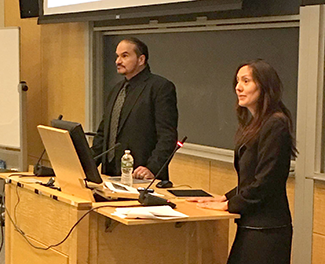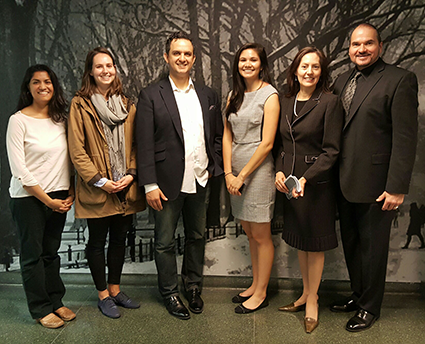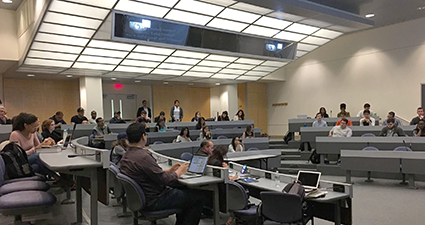Amicus Brief by Profs. Barbara Creel and John LaVelle receives national attention
April 25, 2016 - Tamara Williams

UNM Law School professors John LaVelle and Barbara Creel spoke to a large audience of students at Columbia Law School about their amicus brief for United States v. Bryant.
Two faculty members in the Law and Indigenous Peoples Program at the University of New Mexico Law School combined their expertise in Indian law to write an amicus brief that has received national attention.
Professor Barbara Creel, Director of the Southwest Indian Law Clinic, has expertise and a background in Indian country criminal defense and has written and testified before Congress and the federal courts on the right to counsel for Indians in tribal and federal courts.
She currently is Co-chair of the Subcommittee on Tribal Criminal History and Protection Order Enforcement with the United States Sentencing Commission Tribal Issues Advisory Group.
Professor John LaVelle is a Dickason Professor of Law at UNM School of Law, and has served on the executive editorial board of Cohen's Handbook of Federal Indian Law, the comprehensive legal treatise in the field of Indian law. His research and teaching agenda centers on the historic and contemporary development of the Supreme Court's doctrines of tribal, federal, and state jurisdiction in Indian country.
Creel and LaVelle collaborated to draft and file an amicus brief in United States v. Bryant, a case arising from Indian country in Montana that was heard by the Supreme Court on April 19.
The case addresses whether federal prosecutors violate the Sixth Amendment of the U.S. Constitution when they rely on prior “uncounseled” tribal court convictions — that is, prior convictions where the defendant in tribal court was sentenced to a term of incarceration but was not represented by a lawyer — to prove an Indian guilty when later charged under a congressionally enacted habitual domestic violence offender statute.
Last week, their amicus brief was featured in the National Law Journal, in an article titled “Justices Examine Right to Counsel in Indian Domestic Abuse Cases.”
The brief was also discussed in the Montana Standard and the Missoulian, focusing on local interest in this nationally important case. “Professor LaVelle and I are grateful for the assistance of UNM Law School Research Librarian Ernesto Longa and his research class, who helped with research critical to formulating the position presented in this amicus brief and the brief filed by the National Association of Criminal Defense Lawyers,” says Creel.
Supreme Court advocacy by Law and Indigenous Peoples Program
“It is tremendous to see our Law and Indigenous Peoples program faculty so prominently involved in a major Supreme Court case,” says Professor Christine Zuni Cruz, Associate Dean for the Indian Law Program at the UNM School of Law. “The advocacy work of Professor Creel and Professor LaVelle in the Supreme Court this term has been exceptional.”
LaVelle also provided Indian law expertise in another amicus brief in the Bryant case, filed by a group of criminal justice organizations and scholars. And he co-authored — together with co-counsel Michael Barthelemy (’81) and Geoffery Romero (’91) — a petition for a writ of certiorari and reply brief in an important tribal jurisdiction case still pending before the high court, Jensen v. EXC, Inc.
Creel and LaVelle attended oral argumentation in Washington D.C. when United States v. Bryant was heard in the U.S. Supreme Court on April 19.
Presentation at Columbia Law School

Creel and LaVelle with Columbia NALSA representatives and Columbia Law Professor Shawn Watts (third from left).
On Wednesday, April 20, Creel and LaVelle spoke about the Bryant case and their amicus brief at Columbia Law School in New York City.
They were invited by Columbia Professor Shawn Watts and Columbia’s chapter of the Native American Law Student Association (NALSA).
Creel and LaVelle were met with a large audience of students interested in the civil rights and Indian law issues implicated in the case.
Creel shared her background in criminal defense advocacy and explained the history of the right to counsel for Indians.
LaVelle elaborated further on Indian law cases that serve as the backdrop for this complex area of constitutional law and congressional policy.

Columbia law students listen to a presentation by Creel and LaVelle.
“I was thrilled at the interest in the issues and brief from the students,” says Creel. “The students were genuinely excited to hear our analysis and asked provocative questions about the right to counsel in tribal courts and the larger implications for criminal defendants in Indian country.”
LaVelle says he was honored to work with Creel on this important service of advocacy for the constitutional rights of all Indian people facing prosecution in the federal court system.
He adds, “The warm and respectful reception we received from the NALSA chapter at Columbia, as well as from other students and faculty members in attendance, was especially gratifying following our having aided and witnessed the presentation of Indian civil rights arguments the day before, in the Bryant case at the Supreme Court in Washington, D.C.”

